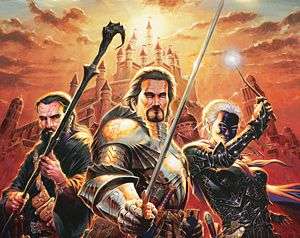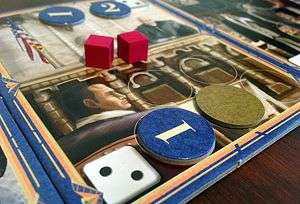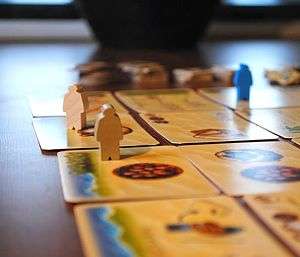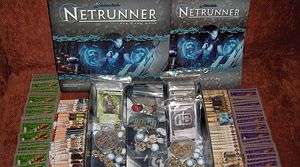Acoustic Gaming: The 2-Player Game-Players’ Guide to 2-Player Games….
by Ste
 If you’ve been following the Acoustic Gaming series of articles, you might have cottoned on to the fact that I really like board games. So much so, that I spend most of my free time playing them these days. Unfortunately the main problem with board games is that you need people physically there to play them with you. However, as people grow older and life gets in the way of things, my days of gathering up a room full of mates to play an epic Game of Thrones game are few and far between. More often than not the only person I can reliably rope into playing is my wife. I’m sure this will be true for many of you, therefore with the help of some of my fellow members of the Sheffield Board Game Club, I’ve created this handy guide which will help you sort the wheat from the chaff in the highly saturated two-player game market.
If you’ve been following the Acoustic Gaming series of articles, you might have cottoned on to the fact that I really like board games. So much so, that I spend most of my free time playing them these days. Unfortunately the main problem with board games is that you need people physically there to play them with you. However, as people grow older and life gets in the way of things, my days of gathering up a room full of mates to play an epic Game of Thrones game are few and far between. More often than not the only person I can reliably rope into playing is my wife. I’m sure this will be true for many of you, therefore with the help of some of my fellow members of the Sheffield Board Game Club, I’ve created this handy guide which will help you sort the wheat from the chaff in the highly saturated two-player game market.
To kick things off I’ll start with my own personal favourite; Lords of Waterdeep. While not strictly a two-player game, it can play up to five (six if you’ve got the expansion) LoW plays marvellously well with just two players and allows for some very high-scoring games. A relatively simple worker placement type game, LoW has you assigning workers to spaces on the board in order to gather resources which in turn will allow you to complete quests and earn victory points. The brilliant thing about this game is that you’ll never quite play the same game twice due to all the different buildings and quest types available and you don’t always know who is going to win until all the bonus points are counted up at the end. Lords of Waterdeep retails for around £40 but you can get it for a lot cheaper than that. For a more in depth look at Lords of Waterdeep, check out our review here
Rik
“My favourite two-player game is Capo Dei Capi, a push your luck strategy game designed by Steve Finn and published by Dr. Finn’s Game.
 Each player takes the roll of a Mob Boss in prohibition era New York. The goal of the game is to gain power and influence, which is measured in points. Each player rolls two dice and this allows them a choice of several actions such as bribe the mayor, invest in a business, or play influence tokens on locations. Once the action has been taken it is locked and you can’t take that action again. Even though this is a dice game, it’s not all about luck, as a lot of thought needs to go into what actions should be taken and when. A bad roll doesn’t necessarily mean you will lose, as you are able to take actions which allow you to re-roll or even sabotage the other player.
Each player takes the roll of a Mob Boss in prohibition era New York. The goal of the game is to gain power and influence, which is measured in points. Each player rolls two dice and this allows them a choice of several actions such as bribe the mayor, invest in a business, or play influence tokens on locations. Once the action has been taken it is locked and you can’t take that action again. Even though this is a dice game, it’s not all about luck, as a lot of thought needs to go into what actions should be taken and when. A bad roll doesn’t necessarily mean you will lose, as you are able to take actions which allow you to re-roll or even sabotage the other player.
I like this game because the theme is great, it comes in a small box, and it only takes twenty minutes to play. Even though the game is quick, it offers a lot of different exciting choices which means replayability is high. I can’t praise this game enough.”
John
“Out of my collection of two-player games Targi comes out on top. It is light enough to be easy to play without burning out your brain, and yet contains enough strategy so that it is interesting for many plays.
 The main mechanism of the game is worker placement, with each player controlling a set of three workers (Targi), which they use to both perform actions and collect cards. The gameboard itself is a 5×5 grid of cards, with the sixteen border cards remaining constant and containing the “action” spaces. The central nine cards of the grid, however, are constantly changing and are drawn from two decks of tribe cards or goods cards.
The main mechanism of the game is worker placement, with each player controlling a set of three workers (Targi), which they use to both perform actions and collect cards. The gameboard itself is a 5×5 grid of cards, with the sixteen border cards remaining constant and containing the “action” spaces. The central nine cards of the grid, however, are constantly changing and are drawn from two decks of tribe cards or goods cards.
Players take turns in placing one Targi each on an unoccupied border card. At the end of the round (after they both have placed three) they may execute the actions on their border cards. Bonuses are given depending on the composition of each player’s tableau and from tribe cards, and the winner is the player with the most victory points.
Targi provides enough competition and strategic gameplay without relying on a “take that” element, which is why I like it so much.”
Liz
“My favourite two player game has to be FFG’s cyberpunk living card game Android: Netrunner. Whether you’re playing as a couple using just the core set, or you’re a hardcore player obsessing over the maths, this is a game that offers immense replayability, depth, and, above all else, fun times.
 Set in a dystopian future the game sees one player take the role of one of the available mega-corporations, while the other player is a hacker trying to break into the corporation’s servers and disrupt their evil plans. There are a huge number of ways for either side to go about winning, meaning you never know quite what you’re going to face. A large portion of the game is therefore figuring out what your opponent is up to – you can never ignore what they’re doing and it’s that interaction with the other player that makes the game so enjoyable to play.
Set in a dystopian future the game sees one player take the role of one of the available mega-corporations, while the other player is a hacker trying to break into the corporation’s servers and disrupt their evil plans. There are a huge number of ways for either side to go about winning, meaning you never know quite what you’re going to face. A large portion of the game is therefore figuring out what your opponent is up to – you can never ignore what they’re doing and it’s that interaction with the other player that makes the game so enjoyable to play.
Netrunner can produce some truly beautiful moments as you call your opponent’s bluff and make the right call at the right time to come from nowhere and take the win. It’s this special sort of satisfaction that gives the game a place in my heart. And the fact it has Quantum Cats in it. Did I mention the Quantum Cats?”
So there you have it, if you’re someone who struggles to get more than one other player to come to your game nights, or you are just someone looking for some new and interesting games to play, you could do a lot worse than checking this lot out. This, of course, is just the tip of the iceberg; there are hundreds, if not thousands, of games to choose from. I highly recommend checking out the BoardGameGeek website for further information on any of the above games and more. Also, many thanks to my friends from the Sheffield Board Game Club for their help in producing this article.
Last five articles by Ste
- Acoustic Gaming: X-Wing Miniatures Game - Review
- Acoustic Gaming: Pandemic Legacy – Season One
- Bored Gaming
- U Wot Mate?
- Tabletop Simulator - Review



















There are no comments, yet.
Why don’t you be the first? Come on, you know you want to!